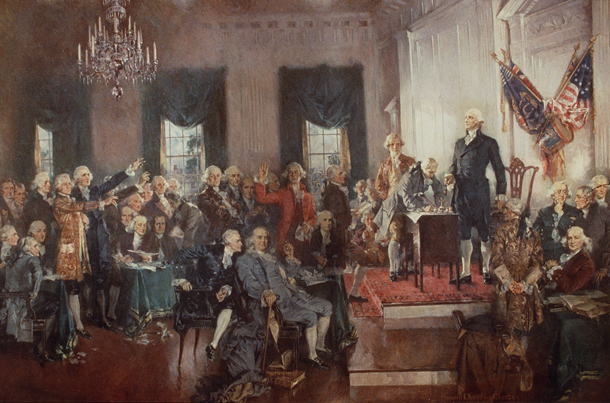Constitution and Founding
'We the People of the United States, in Order to form a more perfect Union, establish Justice, insure domestic Tranquility, provide for the common defence, promote the general Welfare, and secure the Blessings of Liberty to ourselves and our Posterity, do ordain and establish this Constitution for the United States of America.'
Preamble of the Constitution of the United States
Preamble of the Constitution of the United States
Constitutional Resources
"The American Revolution was a beginning, not a consummation." -Woodrow Wilson
The United States of America's most influential document, the Constitution, is the design of the delegates to the Constitutional Convention in 1787. On September 17 of that year the Congress completed its work of revising the Articles of Confederation with the call to for states to ratify a new form of government. The Constitution Convention of 1787 included some of the greatest men in America. Men like George Washington, James Madison, Alexander Hamilton and Benjamin Franklin discussed the future of the once previous British Colonies, with the awareness that if their venture failed, so might their country.
The Constitution's predecessor, the Articles of Confederation, were designed in the conscious of the terrors of tyrants and the power of kings and rulers. For this reason the Articles created a weak central government in order to give power to the States and keep the national government from imposing upon its citizens. Although effective at its makers intent, the Articles left the national government too weak to act for itself. It was not capable of raising an army, printing money, or mediating the states. These limitations, including others, caused the states to finally agree to convene in Philadelphia to revise their government.
'Whatever may be the judgment pronounced on the competency of the architects of the Constitution, or whatever may be the destiny of the edifice prepared by them, I feel it a duty to express my profound and solemn conviction, driven from my intimate opportunity of observing and appreciating the views of the Convention, collectively and individually, that there never was an assembly of men charged with a great and arduous trust, who were more pure in their motives, or more exclusively or anxiously devoted to the object committed to them, than were the members of the Federal Convention of 1787.' (James Madison)
The Constitution's predecessor, the Articles of Confederation, were designed in the conscious of the terrors of tyrants and the power of kings and rulers. For this reason the Articles created a weak central government in order to give power to the States and keep the national government from imposing upon its citizens. Although effective at its makers intent, the Articles left the national government too weak to act for itself. It was not capable of raising an army, printing money, or mediating the states. These limitations, including others, caused the states to finally agree to convene in Philadelphia to revise their government.
'Whatever may be the judgment pronounced on the competency of the architects of the Constitution, or whatever may be the destiny of the edifice prepared by them, I feel it a duty to express my profound and solemn conviction, driven from my intimate opportunity of observing and appreciating the views of the Convention, collectively and individually, that there never was an assembly of men charged with a great and arduous trust, who were more pure in their motives, or more exclusively or anxiously devoted to the object committed to them, than were the members of the Federal Convention of 1787.' (James Madison)

